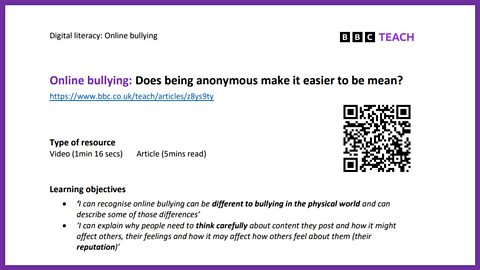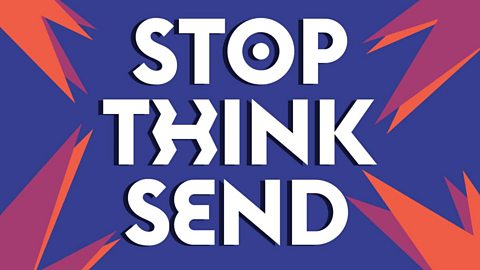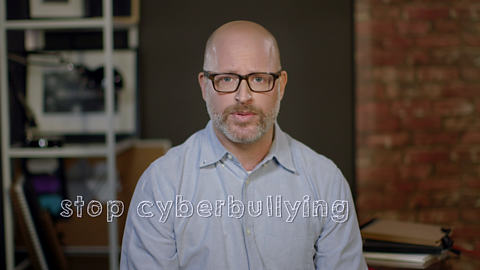Video summary
An explanation of what being anonymous means, and how it can allow people to behave differently online to the way they behave offline.
Top tips and advice on what to do when receiving anonymous messages.
Being anonymous can mean freedom to express yourself without fear but there can also be a downside.
Anonymity can create a breeding ground for being mean online. People might ask or say things they would never say to your face.
If you receive an anonymous message you could see something you really don't want to see. If you send an anonymous text or message via social media, you might write something you would never say in real life because you can't be found out.
However, these things can come back to bite you and using anonymous apps can leave you open to trolling.
Being online and on social media platforms, there is a lot of anonymity and therefore a lot more nastiness.
The great thing about face-to-face conversations is that we are more likely to know how the other person is feeling.
- Are they smiling?
- Do they look sad?
- Did we hurt their feelings, even if we didnãt mean to?
Online behaviour is so much harder to understand, therefore itãs super important to be more careful with our words.

Are you worried?
If you're worried about anonymity and types of online abuse, there are some things to remember:
- You donãt have to take nasty comments or online abuse from strangers. Think before downloading anonymous messaging apps
- You should block or report any users being nasty or unkind
- You can treat people with respect, even if others don't.
It's not nice when people are mean, so let's actively treat people with more respect. The next time you send a text message, image, video or interact via social networking platforms think - would I say say this to their face?
Video: 1 mins 16 secs
Article: 5 min read
Learning objectives
(from the set out by the UK Council for Internet Safety)
ãI can recognise online bullying can be different to bullying in the physical world and can describe some of those differencesã
ãI can explain why people need to think carefully about how content they post might affect others, their feelings and how it may affect how others feel about them (their reputation)ã
Glossary
- Anonymity: where a personãs identity is hidden and/or unknown
- Fake: not real
- Profile: your user account that is displayed to other people, like your friends. Your profile can be built up with content, images, or other pieces of information about you (data)
- Breeding ground: a place or situation where things can develop quickly
- Trolling: someone who is posting or commenting, usually online, in a negative way to specifically get a negative reaction from others
- Aggressive: to behave negatively in a forceful way
Topic introductions and starters
Before the video:
- Ask pupils write down their definition of ãanonymousã
After the video:
- Check their definitions as well as other new vocabulary and key words: anonymity, fake, profile, breeding ground, trolling, aggressive
- Make a list of when it is useful offline to be anonymous, (voting, Secret Santa) and when it is important to let people know your name and details
- Ask pupils in pairs to share their own experiences of either being anonymous online or getting a message from someone who was hiding their identity
- In small groups or pairs, make a list of five positive and five negative reasons for sending a message or posting a comment
- Write down three ways that being anonymous makes it easier to say something negative or hurtful to someone else
Discussion Points
What features of being online make it easier to hide your identify? Youãre not in the same place; others canãt see your face; you can use a fake identity; it can be difficult to find out
What would someone want to use a fake identify? They donãt feel confident as themselves? They donãt want to be caught being mean? They think itãs just a fun prank?
How can you avoid anonymous people online? Only talk to people you know in real life; avoid apps that allow anonymity; check profiles that look fake
How can talking to people on anonymous apps be dangerous? You donãt know who they are; you canãt find out if something bad happens
What is the difference between being anonymous and keeping your personal information private?
Fillers and fast finisher activities
- Create some additional graphic decoration panels like the ones in the article to illustrate different key points of the article
- Make a crossword using some of the key words in the article ã create clues to help people solve the crossword
- Make a mind-map showing all the ideas in the article and video, and how they link together
- Summarise the article into four or five important sentences, one for each section ã summarise further into just one or two key words
- Write a DOs and DONãTs list for dealing with anonymity online
Signposting potential homework activities
- Create a top-tips style illustrated leaflet with some of the suggestions for avoiding problems with anonymity online
- Create an acrostic poem using ANONYMOUS as the first letters of each line ã cover the main points of the article
- Add some extra suggestions to the five given in the video and article ã write a short paragraph explaining each one.
For download/printing

More from: Online bullying
Five things to ask yourself before you post. document
This article looks at five things to ask and think about before posting something that might be a problem on social media.

7 tips to beat cyberbullying. video
This article gives an explanation of what cyber-bullying is, why it happens, and what it feels like to be cyber-bullied.
